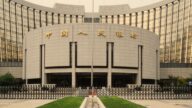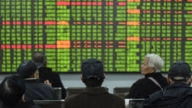【新唐人2013年09月16日訊】自今年6月份大陸銀行業發生錢荒以來,有關各地銀行將暫停房貸的消息層出不窮。最近,深圳4家銀行公開宣佈暫停房貸,中共持有的國有大行也加入了停貸的行列,在二三線城市也出現了暫停房貸的現象。有分析人士認為,這說明瞭大陸錢荒正在蔓延,已經蔓延到地方銀行了。
《中國房地產報》9月10號報導說,深圳4家銀行公開宣佈暫停房貸。《重慶商報》9月9號消息也表示,由於銀行信貸額度吃緊,重慶部分銀行暫停受理二手房貸款﹔同一天,《中安在線》指稱,合肥最近有4家銀行暫停了二手房貸款,其中農行、交行、工行等國有大行也加入停貸行列。報導表示,最近幾天有蔓延的趨勢。
美國南卡羅萊納大學/艾肯商學院教授謝田:「一個多月前看到的錢荒,實際上是國有的中央銀行、大銀行在全國的範圍內的錢荒。後來,中國(共)政府不得不輸入幾千億人民幣暫時緩解了一下錢荒。現在看來,這個錢荒已經發生在一些地方性銀行,確實錢荒正在蔓延。」
據了解,發生錢荒後,大陸有些銀行就開始收緊房貸,停止二手房貸款,沒有暫停二手房貸款業務的銀行,利率也出現較大幅度上浮。
8月底,北京各銀行房款利率優惠基本全部取消,甚至有銀行在基準利率基礎上上浮了20%。與此同時,大陸媒體《每日經濟新聞》也發表文章表示,因為部分額度已用完,廣州多家銀行暫停房貸。
《新唐人》特約經濟評論專家傑森分析,這次二三線城市房地產貸款放緩、停滯,是中共銀行系統出於自保的措施。
《新唐人》特約經濟評論專家傑森:「中共看到,它們控制房地產的措施一再失敗,房地產泡沫越來越大,一線城市有一定需求,而二三線城市纍積的風險越來越大,為了保全它們銀行系統,控制貸款的數量,所以這是一個自保的因素。」
除了採取相應的措施外,據了解,6月份和7月份中共央行通過非公開(定向)的方式釋放數千億元流動性,這些資金在近期相繼到期。
但是美國南卡羅萊納大學/艾肯商學院教授謝田認為,中共當局的政策性調整,並沒有徹底解決錢荒的問題,可能習李政府並不是真正想接胡溫時代的經濟包袱。李克強有意讓這個錢荒爆發,把這個包袱卸掉。
近期,除了亞洲首富李嘉誠不斷拋售在大陸的產業外,9月3號,美國銀行悉售建設銀行20億H股,套現110多億港元。隨後,中共工、農、中、建四大國有商業銀行的外資戰投已全部「撤退」。
那麼外資的撤退是否與中國的錢荒有關呢?
謝田:「跟外資撤離沒有甚麼直接的關係,這個是中國國有銀行內部自己的現金緊張,外資撤離是因為外資對中國經濟未來不看好,是因為中國經濟的下滑,萎靡下去,跟錢荒不是有直接的聯繫,但是肯定是互相影響。」
謝田表示,外資撤離會打擊中共當局的信心,同時也打擊了中國投資者的信心,也許還會催生其他一些房地產泡沫、股市泡沫的破滅。
採訪/陳漢 編輯/田淨 後製/王明宇
China’s Second and Third Tier Cities Cease Mortgage Loans: Are Money Shortages Worsening?
Since June this year, money shortages
have occurred in Chinese banks.
News has repeatedly indicated that banks in
certain cities had stopped mortgage services.
Recently, four banks in Shenzhen announced
they would no longer provide mortgage loans.
Several state-owned banks and banks in second
and third tier cities also made the same decision.
Analysts said that money shortages
are spreading to the local banks.
On September 10, China Real Estate Business reported
that four banks in Shenzhen stopped mortgage services.
On September 9, Chongqing Economic Times
reported that several banks in Chongqing have
stopped offering mortgages to second hand
home buyers due to tightening credit limits.
On the same day, anhuinews.com claimed
that four banks in Hefei had stopped
mortgage loan from second home buyers.
State-owned banks, including Agriculture Bank,
Bank of Communications, and Industrial &
Commercial Bank, have made the same move.
It has been reported that this
phenomenon will likely continue.
Xie Tian, Professor at the University
of South Carolina Aiken Business School:
“We saw money shortages one month ago.
In fact, it is the state-owned central banks
and major banks that were short of money.
The Chinese regime had to inject several hundred
billions Yuan to temporarily solve the problem.
Now money shortages have spread
to local banks. It is indeed spreading.”
Sources said that since the money shortages
occurred, some banks began to limit mortgage loans.
They have stopped second-hand home loan services.
If the banks hadn’t stopped second-hand loan
services, it would increased their interest rates.
At the end of August, banks in Beijing cancelled
discount deals on interest rates for mortgages.
Instead, some banks increased
20% on the standard interest rate.
China’s National Business Daily has reported that many
banks have ceased mortgage services in Guangzhou.
They have run out credit.
Jie Sen, NTD special economic commentator,
said that in second and third tier cities, mortgage
loans have slowed down and have stagnated.
It is the CCP’s measures to protect the banking system.
Jie Sen: “The CCP realized its failure
of it’s measures on real estate control.
Instead, the housing bubble has grown larger.
Properties are always demanded in first-tier cities,
yet risks in second and third tier cities are increasing.
In order to protect the banking system, they need to
control credit limits, which is a method of self-protection.”
According to ftchinese.com on September 6, China’s
Central Banks injected several hundreds billion Yuan.
This was via non-public reverse repo agreements
into the banking system in June and July.
These funds are due in the near future.
Xie Tian believes that the authorities adjusting policies
didn’t completely solve the problem of money shortages.
Maybe the new leadership does not really want to
take the economic burden from the previous regime.
Thus, Li Keqiang deliberately let the money
shortage break out, to get rid of the burden.
Recently, Li Ka-shing, Asia’s richest person,
has been pulling his property out of China.
On September 3, Bank of American sold
two billion H-shares of China Construction
Bank for over HK$11.7 billion (US$1.47 billion).
Soon, other foreign banks sold all their shares
in China’s four major state-owned banks.
Does the foreign investors’ exit from China have
a link to the Chinese banks money shortages?
Xie Tian: “The two don’t have any direct links.
It is because state-owned banks
internally are tight on cash.
Foreign investors are not optimistic about China,
and in addition, the Chinese economy is declining.
Thus, it is not directly linked with money shortages,
but both certainly have influenced each other.”
Xie Tian said that foreign investors’ leaving would
undermine the CCP’s and investors’ confidence.
It could trigger housing and stock market bubbles to burst.
























